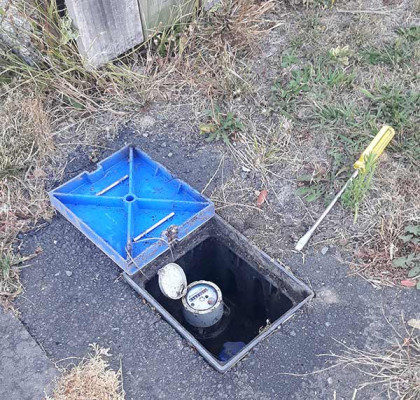Water meters are usually located below ground level in a box near the road boundary of your section.

Water meters are located near your boundary.
There is a shut off valve in the meter box so you can turn your water off for any plumbing repairs. Keep the meter free clear of shrubs, plants and bark.
It is a good idea to check your water meter regularly to ensure you have no leaks. Moderate dampness is common for underground boxes though if a water can be seen flowing, there is a leak.
* The blue handle is your valve, if you ever need to turn your water off you can use this.
* Pipework from the meter to your house is privately owned, the property owner must ensure this is maintained and pay for repairs.
* We may read your meter for billing purposes, but also during water rationing to ensure water wastage is minimised

Water meter dial shows usage in cubic metres. The black numbers are read and billed on your water invoice.
Reading the water meter is a simple task.
There are eight numbers: The four on the left record whole cubic metres, the four on the right in red record parts of a cubic metre (litres).
01827631 shows you have used 01827.631 cubic metres (m3) of water. Put another way, you have used 1,827 cubic metres and 631 litres of water.
A cubic metre equals 1,000 litres or 220 gallons.
When it comes to charging, only the black numbers (cubic metres) are used and will appear on your water account.

Water meter dial with cog - if the cog keeps moving when everything is off, you may have a water leak.
Water meters are usually located below ground level in a box near the road boundary of your section.
If your consumption seems high, you should carry out this simple leak test on your plumbing:
Trace your water pipe from the meter to the house. Clues to water leakages include:
We sometimes get requests to pay plumber’s invoices for callouts associated with public water and wastewater leaks and blockages attended by plumbing contractors.
However, we don’t pay for plumbing work that is instructed by anyone other than our community infrastructure team.
The ‘point of supply’ for water and wastewater is the water meter/restrictor and the property boundary respectively. Any pipework after this point is private and any leaks or blockages are the responsibility of the property owner.
If there is uncertainty about whether a leak is a private matter or not, people should contact us first to investigate. They won’t be charged for an investigation by our approved contractor who will undertake repairs if it is in the public network.
If not, the property owner will be recommended to call a plumber to undertake the private repairs.
Be aware that if the property owner chooses to contract a plumber directly and it turns out not to be a private matter, we can’t cover the cost of the callout.
To ensure the efficient use of water by ratepayers, and provide an incentive to ratepayers to promptly repair any leaks to their reticulation, and to moderate financial consequences for significant or severe leaks.
Note: Residential and non-residential ratepayers have some different eligibility for remission as detailed in this Policy.
In order to prepare a final bill for the property you have sold, you should contact us for a final reading of your water meter when you move out.
These special readings are done weekly and an extra charge applies.
Also, remember to check that the meter is being read at the house you are moving into.
Last modified: